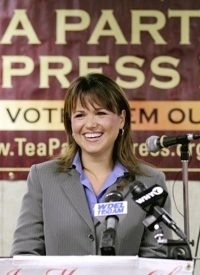
The headline in the September 14 Washington Post sounded ominous for the Republicans: “Tea party wins in northeastern primaries could bode well for Democrats.” The article continued with a pessimistic tone for the GOP, should Tea Party-backed candidates win against establishment Republicans in Tuesday’s primary:
In the era of the “tea party,” is the moderate northeastern Republican in danger of going completely extinct? Tuesday’s primaries could give a clue.
Although tea party candidates have bumped off establishment favorites in GOP primaries this year, such results have generally come in conservative states where the victors also have a serious shot at winning in November.
The Northeast, meanwhile, is known for a more moderate, even liberal, electorate.
In these parts, moderate congressional Republicans have seen their numbers decline over the past few election cycles, with many longtime officeholders sent packing by the Democrats.
That is because these races are occurring in moderate-minded districts where conservative candidates would have limited appeal in a general election, even in a year when public sentiment has swung against the Democrats.
The Post article cited other examples where conservatives were cast as spoilers, such as New Hampshires 2nd Congressional District race. There, the writer of the Post story opined, the more moderate candidate would be the strongest contender in the general election, but first had to defeat two more conservative opponents in the GOP primary.
A similar tone of pessimism for the GOP was expressed in a New York Times article on September 13:
The Senate primary in Delaware on Tuesday was prompting anxiety among party officials, who feared that a victory by Christine O’Donnell, a candidate backed by the Tea Party, could complicate Republican efforts to win control of the Senate. Republican leaders rushed to the aid of Representative Michael N. Castle, a moderate lawmaker and former governor, as internal party warfare including accusations of a death threat intensified on the eve of the primary.
ODonnell has also been endorsed by former Alaska Governor and vice presidential candidate Sarah Palin and South Carolina Senator Jim DeMint.
If these dire predictions were meant to scare conservative Republicans into voting for Castle, the establishment GOP candidate in Delawares primary, they had little impact on Lynn Brannon, described in the Times article as a leading Tea Party activist in Delaware. Said Brannon:
We need to prove to the Republican Party that we need to move it to the right, that we need to move back to good basic values and the Constitution. I will have a little bit of regret [if ODonnell loses], but the Republicans need to learn their lesson: that we want things to go back to the right.
The Times also quoted liberal Senator Robert Menendez of New Jersey (chairman of the Democratic Senatorial Campaign Committee) about his take on what is wrong with the Republican Partys political strategy:
“Republicans have chosen extremists to be their nominees, and this has changed the political map of the cycle, said Menendez…. In a year where Republicans want these races to be all about Democrats, Republican nominees who have extreme positions help us make the contrasts we need to make. [Emphasis added.]
Menendez may have unintentionally put his finger on what is wrong with the Republican Party other than nominating extremists. For if the Republicans stick to nominating so-called moderates, there is apparently little contrast between the two parties.
In stating the obvious, Menendez is whether he intends to our not affirming the truth in what longtime Democratic Alabama Governor George Wallace said when he ran for President in 1968 on the American Independent Party (a forerunner of the Tea Party?) ticket against former Republican Vice President Richard Nixon and Democratic Vice President Hubert Humphrey. Wallace said at the time: “There’s not a dime’s worth of difference between the Democrat and Republican Parties.”
Major media (including the Times and Post) reports about this years primaries frequently bandied about the political terms moderate and extreme. The Post article used the word moderate” eight times, the Times once. A CBSnews.com article quoted from Rep. Mike Castle (a moderate, the Times assures us) who said of his opponent, ODonnell: “I think she’s too extreme for Delaware.” (Emphasis added.)
As we noted above, Menendez also used the E word.
Such tarring of those who adhere strictly to the Constitution with the extremist brush is nothing new, however. The terms were used heavily in the 1964 election, particularly at that years Republican convention, when New York Governor Nelson Rockefeller (the unofficial leader of the liberal, Eastern wing of the Republican Party) called on Arizona Senator Barry Goldwater to repudiate your right wing support. It was commonly understood that Rockefeller was referring principally to the many members of The John Birch Society and like-minded constitutional conservatives who were Goldwater supporters.
For his efforts, Rockefeller was soundly booed by Goldwater delegates when he came to the podium to address the convention.
Goldwater, instead of repudiating right-wing extremists, made a clarion call out of the terms, stating in his presidential nomination acceptance speech: I would remind you that extremism in the defense of liberty is no vice! And let me remind you also that moderation in the pursuit of justice is no virtue!
Goldwater would have agreed with Senator Menendez statement that the GOPs extremist candidates help Democrats make the contrasts they need to make. But the converse of that, that such candidates help the Republicans make the contrast they need to make is greater still.
A popular Goldwater campaign election slogan was A Choice, Not an Echo, which was also the title of a book published that year by conservative activist Phyllis Schlafly.
Goldwater’s defeat to incumbent President Lyndon Johnson was not a repudiation of the Senators conservatism. In fact, many Americans were unfamiliar with the philosophy of conservatism, after having had only liberal presidential candidates to choose from both parties at least since the election of 1932. The Goldwater defeat was instead the result of one of the worst smear campaigns waged against any presidential candidate in modern U.S. political history. Anti-Goldwater commercials depicted a Social Security card being torn up and a nuclear mushroom crowd obliterating the landscape as a little girl picked daisies both scenarios supposedly being likely to occur if the “extremist” Goldwater were elected Preisident.
As if that were not enough, even after Goldwaters nomination, the establishment Republican Party in many states refused to conduct a serious campaign to support their nominee. As just one example, the situation was so bad in New Jersey that the Arizona Senators supporters started Citizens for Goldwater Groups to conduct the campaign activities that the official party deliberately neglected. (This writer, at the age of 16, joined such a group in his homestate of New Jersey.)
Thanks to the many tea party groups, conservative, libertarian, and constitutionalist candidates are faring better than ever before, and scaring the pants off GOP moderates and the rest of the Eastern liberal establishment.
Photo: Delaware Republican Senate candidate Christine O’Donnell, at a Tea Party Express news conference in support of her election bid, in Wilmington, Del., on Sept. 7, 2010: AP Images



